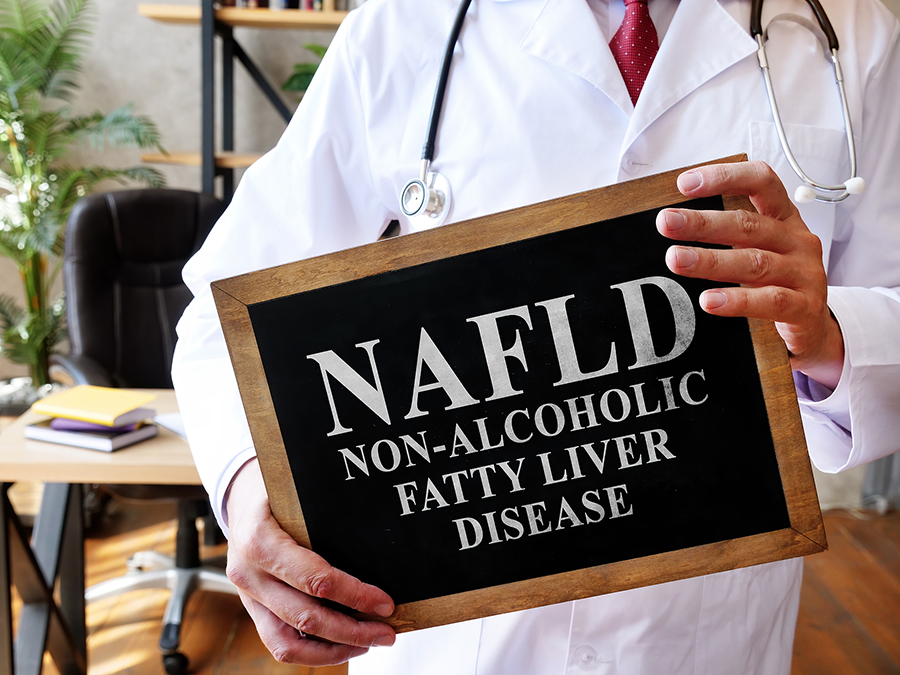 Nonalcoholic fatty liver disease (NAFLD) is not only becoming more common but is also strongly associated with deadly conditions like heart disease.
Nonalcoholic fatty liver disease (NAFLD) is not only becoming more common but is also strongly associated with deadly conditions like heart disease.
Some are saying it’s taking over for high blood pressure as the silent killer.
There is a common vitamin that can protect you from dying from NAFLD according to a new study published in JAMA Network Open.
The researchers analyzed the data of 4,315 adults aged 20 and older diagnosed with NAFLD. The data came from the U.S. National Health and Nutrition Examination Survey (2003–2018).
They identified NAFLD using the United States Fatty Liver Index, a reliable measure for such studies.
Participants’ vitamin B3 intake was analyzed through interviews, wherein they recounted their food consumption in the 24 hours preceding the interview.
Researchers then tracked these individuals for an average of 8.8 years, recording deaths and their causes. Over this period, they recorded 566 deaths, with 197 attributed to cardiovascular diseases.
What did they find about the influence of vitamin B3?
-
1. People with the highest daily intake of vitamin B3 (over 26.7 milligrams) had a 35% lower risk of death from any cause compared to those with the lowest intake (18.4 milligrams or less).
2. There was also a 30% lower risk of death specifically from cardiovascular disease (heart disease and stroke) in the high vitamin B3 group.
This shows clearly that vitamin B3 could be a great nutritional treatment for individuals with NAFLD.
The researchers suggest that a daily intake of around 20 milligrams could be beneficial, although they stop short of recommending supplementation, which can be seriously harmful in larger amounts. Instead, they focus on dietary sources.
But why might vitamin B3 be effective in this regard?
Scientists don’t quite know, but they are aware that it plays important roles in the conversion of food to energy and in the management of healthy cholesterol levels.
Vitamin B3 is also known as niacin. It is plentiful in food sources like liver, chicken breast, turkey, salmon, tuna, anchovies, lean pork, brown rice, Portobello mushrooms, nutritional yeast, peanuts, and avocado.
As such, it shouldn’t be too hard for you to consume enough to help your liver fight off the food with which you have bombarded it. It is, of course, also a good idea to eat in moderation so you maintain a healthy body weight that won’t tax your liver beyond its capabilities.
Just another reminder, however, that vitamin B3 supplements are excessive, unnecessary, and most probably harmful. It can cause stomach upset, liver damage, high blood sugar, and gout. So, focus on healthy food sources for your vitamin B3 fix.
But B3 doesn’t cure NAFLD. For that, you need to take a few more natural steps as explained here…

 Overcoming IBD
Overcoming IBD Multiple Sclerosis
Multiple Sclerosis Banishing Bronchitis
Banishing Bronchitis Gum Disease Gone
Gum Disease Gone Overcoming Onychomycosis
Overcoming Onychomycosis Neuropathy No More
Neuropathy No More The Prostate Protocol
The Prostate Protocol Brain Booster
Brain Booster
 Ironbound
Ironbound
 Solution for Shingles
Solution for Shingles
 The Bone Density Solution
The Bone Density Solution
 The Ultimate Healing Protocol
The Ultimate Healing Protocol
 The Parkinson's Protocol
The Parkinson's Protocol
 The Chronic Kidney Disease Solution
The Chronic Kidney Disease Solution
 Overthrowing Anxiety
Overthrowing Anxiety The Fatty Liver Solution
The Fatty Liver Solution The Hypothyroidism Solution
The Hypothyroidism Solution
 The End of Gout
The End of Gout The Blood Pressure Program
The Blood Pressure Program
 The Oxigized Cholesterol Strategy
The Oxigized Cholesterol Strategy
 Stop Snoring And Sleep Apnea Program
Stop Snoring And Sleep Apnea Program
 The Arthritis Strategy
The Arthritis Strategy The Vertigo & Dizziness Program
The Vertigo & Dizziness Program The 3-Step Diabetes Strategy
The 3-Step Diabetes Strategy Hemorrhoids Healing Protocol
Hemorrhoids Healing Protocol The Erectile Dysfunction Master
The Erectile Dysfunction Master Weight Loss Breeze
Weight Loss Breeze The IBS Program
The IBS Program The Insomnia Program
The Insomnia Program The Migraine and Headache Program
The Migraine and Headache Program The Neck Pain Solution
The Neck Pain Solution The Menopause Solution
The Menopause Solution The Ejaculation Master
The Ejaculation Master The TMJ Solution
The TMJ Solution The Acid Reflux Solution
The Acid Reflux Solution The Fibromyalgia Solution
The Fibromyalgia Solution The Psoriasis Strategy
The Psoriasis Strategy